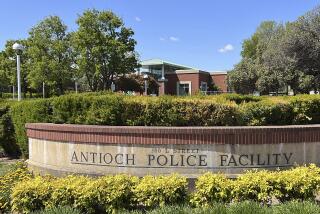Officers’ Gun Buys Probed
Los Angeles police officers are under investigation for allegedly using fraudulent documents to purchase law-enforcement-only versions of assault rifles before the weapons were banned, according to law enforcement sources familiar with the investigation.
The precise number of officers whose actions are being investigated is unclear, but as many as 40 suspect letters were seized from one gun dealer and many others are under review.
Any officer who faked a letter to obtain an assault weapon could be guilty of a felony and could also face LAPD discipline, according to state laws and Police Department guidelines.
State and local investigators are scrutinizing letters the officers were required to provide from police superiors stating that they had been given departmental permission to buy the weapons. Investigators suspect that the signatures on many of the letters were forged or that the names of the supervisors were not accurate, according to sources familiar with the probe.
Hallye Jordan, a spokeswoman for the California attorney general’s office, confirmed Wednesday that her agency had an ongoing investigation regarding the illegal sale and purchase of assault weapons and that some of the transactions may involve police officers.
LAPD Cmdr. Tom Lorenzen, who heads that department’s Internal Affairs Division, said the Police Department was conducting an investigation of its officers in conjunction with the federal Bureau of Alcohol, Tobacco and Firearms. As of now, he said, no action has been taken against any officers.
“We’re examining the conditions under which the purchases were made,” Lorenzen said. He added that if any documents were forged, that could violate federal law as well as LAPD policy.
One law enforcement official who spoke on condition of anonymity said a search warrant served on one gun dealer yielded as many as 40 letters on Police Department letterhead stating that the officers had permission to buy the firearms. Some investigators have indicated that they believe some or all of those letters may be fraudulent.
Under the law, a specific allowance for the sale of assault weapons was made for any police officer “authorized by his or her employer to possess or receive the assault weapon.”
The law defined that authorization as a written certification from the head of the officer’s agency and said it must identify the officer and the weapon that the officer was permitted to possess. The law does not specify whether the “head of the agency” would mean that only the top officer, in this case the chief of police, would have the power to issue such an authorization or whether “agency” might be construed as an individual police station or division.
Police Chief Bernard C. Parks has long been a supporter of strong gun control laws. Early in his tenure as chief, Parks advocated the collection and destruction of all assault rifles in circulation, a position that earned him praise and scorn among police officers.
Parks’ stance on assault weapons may have led some officers to conclude that department supervisors would not have approved their requests to purchase the guns, some officials suggested.
As part of the probe, state and federal investigators have seized documents from gun dealers who sold the weapons to officers. “If the letters were forged, that’s not a good thing,” said Lawrence Wolff, an Encino gun dealer whose records were seized by investigators from the ATF and the state Department of Justice. “It’s like any other forgery. It’s pretty rotten.”
Wolff said he sold 200 to 300 assault rifles to police officers from several Southland agencies before the ban. Among the records seized from Wolff, he said, were letters that officers said were signed by supervisors.
Wolff said he had no idea whether any of those letters were forged.
The weapons that officers purchased from dealers before the ban went into effect were discounted. Wolff said he sold assault rifles to officers at $800 apiece, although a private citizen would have paid as much as $2,500 for a similarly equipped weapon. Such discounts were common among dealers who were selling to police, Wolff said.
More to Read
Sign up for Essential California
The most important California stories and recommendations in your inbox every morning.
You may occasionally receive promotional content from the Los Angeles Times.











